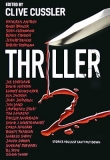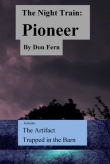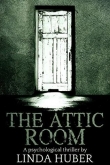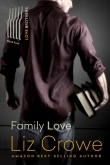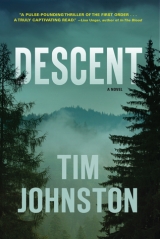
Текст книги "Descent"
Автор книги: Tim Johnston
Жанр:
Триллеры
сообщить о нарушении
Текущая страница: 15 (всего у книги 25 страниц)
42
Spring comes, even there. Or perhaps false spring.
Snowmelt dripping from the shedroof and ringing faintly on the floors of tiny wells in the snow, frail airholes to the earth. Note upon hollow note. Th e shingled roof, bared to the sun, flexes and cracks like something coming awake. When she puts her nose to the peephole in the wood over the window, she can smell the heated sap of the pines beyond the glass and she aches with the feeling of spring after the long Wisconsin winter. Th e cinder track rising through the snow like a hot, primordial ring. She listens for the sound of water running, of snowmelt finding its way in thin cascadings, meeting, gaining mass and speed, churning for the far valleys, for the great rivers to the sea. But which sea?
He is staying away longer. Days, sometimes. Th e food runs out. Th e wood runs out. She hoards her water. In the dull little mirror is the shape of her skull. No one is there.
SHE KEEPS AT HER work, her diminished body pitched against the length of chain, milling halfway around and then back again, listening to what the links are telling her. On the surface of the steel plate, spanning the two thick welds of the ringbolt, lays a tiny field of dull glitter, winking and changing visibly every few passes with the addition of some new and sizable granule of steel or rust. Th e largest of them fall at the moment when the mated crooks of the bottom link and the ringbolt grind and fight and give way in a sudden twangy jump that makes her heart jump too with the momentary loss of resistance and the feeling, as on that long ago swing set, that the link has broken and she is about to go sailing, free, into space. Again and again, that deception.
After one such twang so profound she must take a hop for balance, she stands in dismay when she finds the chain still taut, still unbroken at the ringbolt. Something breaks within her then and she begins to haul wildly at the chain, and it’s her own noise, she understands later, the torrent of curses upon the tormented chain, that causes her to miss the sound of footsteps outside in the crusted snow.
Th e first she hears of him is his voice.
Hello? he calls, freezing her.
She drops the chain. Her heart slamming.
It comes again: Hello? Someone in there?
It’s not him. It’s some other man. Close, and not close. Well back from the door. Keeping his distance, according to some law of mountain etiquette. Or fear at what he heard, her wild thrashing.
Her throat constricts, her jaw opens, and a voice she does not know calls out, Hello? Is someone out there?
Hello, the man calls. I saw the smoke. I thought it might be a fire.
She takes a step toward the door and her right leg halts painfully in midstride and she looks back in confusion at the length of chain on the floor.The leather-wrapped cuff at her ankle, the big padlock with the word Master at its base. Her own naked foot, filthy and alien.
She turns back to the door. Are you the police?
He doesn’t answer. Th en: Who are you? And she knows he is just a man. Not the police. No gun. No dogs. No walkie-talkie. No helicopter on its way. No father no mother no brother.
Who are you? he says again. Are you all right?
She puts a hand to her throat and feels the words in her fingers as they come up, as she says her own name for the first time in so long. Her family is looking for her, she says. Th e police are looking for her. A man has been keeping her here, please help.
Th e snow crunches and the man is approaching.
All right, he says, all right. Take it easy. Did you say Caitlin? Close now. On the other side of the door. She hears the padlock shift. Hears him tug on it. Caitlin? he says.
Yes?
Where is he?
I don’t know. He left me.
How long ago?
She shakes her head. Two days? She swallows down her climbing heart. Please help me. She can hear him breathing hard in the thin air. Th ere’s an ax somewhere, she says. Do you see it?
He takes a step back from the door. No.
It’s out there, she says. She can see it so clearly. I hear him chopping all the time.
Th e man takes a few steps away, then comes back.
Is there another way in? A window? he says, and she says, On the other side, but it’s locked too, and his footsteps move away from the door and grow faint as he makes his way around the shack.
She drags the chain across the floor and steps onto the cot and puts her eye to the small burning hole in the window board, stopping the coin of light.
Incredibly, he is already there—exactly there. Dark shape of him in the white nimbus of vision. Dead-centered like a figure posed in a lens not yet focused. Th ere he stands before her, and yet the sound of his footsteps reach her through the wall to her left. He is standing still and he is walking around the shack, both. She blinks in the tearful light and the figure in the peephole clarifies, taking its true form, and a blade comes into her chest to halve her heart like an apple.
Th e footsteps progress around the corner and grow louder, nearer, and then they halt, short of the window, short of what she can see of the world, and she hears the man say Jesus. He makes a sound like a kind of laugh. Where’d you come from, buddy?
Same place as you, I reckon. Th e Monkey smiles and his face begins to turn toward the window and she drops like loose bones to the cot.
I saw the smoke, the Monkey says. Th ought there was a fire.
So did I, says the man. But there’s somebody in there. He takes two steps and stops. Th ere’s a girl inside.
Slumped against the wall, knees hauled to her chest, she hears them as though they stand in a tunnel, voices tubing along the stone walls toward the opening.
I know, I heard, the Monkey says. Heard her say a man’s been keeping her up here.
Th ese words roll and die in the tunnel.
You wouldn’t be that man, would you? says the Monkey.
Hell no, says the man. And nothing else.
Th ey are silent, the world silent, until a crack detonates in the roof timbers, relaying in the wall where her shoulder touches it and jolting down through her.
Pretty funny the two of us arriving at the same time, says the Monkey, and the man says, I saw the smoke.
You said that. Th e Monkey sniffs. You don’t look like a ranger.
I’m not.
You’re not?
No.
What are you then?
What am I? Hell, I’m just a hiker.
A hiker. Th e Monkey shifts somehow in his jacket. You’re a ways off the trail, aren’t you?
Like I said, I saw the smoke.
Th e Monkey shifts again. You saw that?
I smelled it first.
Ah.
Th ey are silent. Water drips from the roof and rings in its wells.
What about you? the hiker says.
What about me?
What brings you up here?
I’m a volunteer ranger.
A volunteer ranger. What’s that mean?
It means I’ve got a cabin down the mountain I don’t want burning up.
Th e hiker says nothing. Th en he says, Hadn’t we better see about getting her out of there? She might be hurt. Are you hurt in there? he calls.
Run, damn you, she whispers. Get away. Get down the mountain.
She sounded fit enough a second ago, says the hiker. Th ere’s a padlock on the door, but she said there’s an ax out here somewhere.
I heard that. Is that it over there?
Where?
Behind you. Under that tree. Where that wood is.
Th e hiker changes his footing in the snow, is still, and then moves quickly in the direction he came. Okay, he calls. It’s an ax. I found the ax, he calls to her. Th ere’s another man out here. He’s a volunteer ranger. We’re gonna come around and knock the padlock off the door, Caitlin.
He is walking again and she tracks his footfalls, and the Monkey’s, as they circle the shack, and soon the hiker arrives once more at the front door.
Don’t, she breathes. Don’t, don’t . . .
Don’t do it like that, says the Monkey. Use the poll.
Th e what?
Th e blunt end.
Why?
Cause you’ll ruin the edge.
Who gives a damn if I ruin the edge?
Th ere is silence. Th en the hiker says Wait and through the door comes a sound she knows, a sharp festive pop, like a single firecracker. Hardly loud enough to startle a bird yet sudden and sharp enough to cleave open a mountain and send it shearing down itself. Immediately the door shudders in its jamb, as if he has decided to throw his weight at it, but feebly, and then in defeat has slid slowly down to the snow.
I do, says the Monkey.
She hears him click open the pistol. Eject the casing. Snap the pistol shut again. Something scuffs at the outside of the door, down low, near the floor. Like an old dog scratching to be let in. Th ere is a second pop and the scuffing stops.
SHE IS ON THE cot as before, unmoved, legs drawn up in the same tight ball of herself, when she hears him returning. His footsteps, the sled runners, moving more easily through the snow. She remembers the high snowy ledge, the tumbling emptiness beyond, but he has not been gone long enough for that, has stashed the body someplace nearby. As he unlocks the padlock the timbers crack overhead and her legs spasm, kicking as they do in dreams of running, and her mind plays her a scene in which the last thing she sees and feels in life is the cold, blued face of the only other human being in all this time who knew where she was, who heard her voice. A stranger with whom she will now lie through however many years, centuries, nothing to do but hold each other until they’re found, rags of cloth and mummy’s flesh inseparable, histories inseparable, locked in each other’s bones. More in love by the look of them than any man and wife of the living world.
43
They rose together for coffee and cold cereal and they worked through the mornings at chores, together and separate, and then they sat with Emmet for lunch, the boy quietly chewing and Emmet telling his stories as before and never asking the boy where he’d gone or what he’d done in all that time away, and Emmet’s son Billy passing through these scenes like a character in a play, commenting in merry disdain and moving on, never stopping, always on his way to more promising scenes, more promising company.
At the waitress’s house they watched from the door stoop as the dog stepped gingerly through the snow, finding the places that suited her, the two of them standing in a draft of warmth and scent from inside the little house until the door was shut again and locked. Later they rang the bell over the cafe door and Maria smiled to see them.
Saturday found Sean up with the dawn to shower and shave, to brew the coffee and carry a cup of it out onto the porch. Cold silence and no movement in the treetops along the ridgelines and not a trace of cloud in the sky. Second week of March and no change anywhere, no sign of winter’s end. Across the way sat the El Camino, black and gleaming.
The mares nickered and blew at his approach and he stepped to the stall with an apple rolling in his palm.
He was leading the mare named Belle from her stall when the old man arrived at the bay door with his cup of coffee, dragging the red cap from his head as if entering a church.
“You thinking about riding?” he said, and the boy said that he was. He hitched the mare to the post and went back for the other while Emmet scooped oats into the galvanized pails fixed to either side of the post. When both mares were hitched and feeding, the boy returned to the stalls and began raking the soiled straw into a heap.
Emmet stood patting the near mare’s neck. With his eyes on the horse, he said: “You look a might fussed up for such work.”
The boy took up the pitchfork and said, “No more fussed than usual.”
Emmet patted the mare’s neck. “You might have yourself some company, you’re not careful.”
“I might?”
“Might.” He sipped his coffee. “Since you been gone there’s a gal been coming over Saturdays and helping with the horses.”
“That’s what I hear.”
“She don’t come every Saturday, of course. Sometimes she gets busy with other stuff. Fact is, I’m surprised she comes a’tall, lately.” He coughed and turned his face and spat, and toed a little mound of dirt over the spot. “She keeps on coming when she feels like coming, though. Calls me up when she don’t.”
The boy pitched the last of the straw into the wheelbarrow and rolled it out into the sunlight and came back in and took up the curry brush and began brushing the mare named Nellie.
“She ain’t called today,” Emmet said. “The gal. Why I said that about you maybe having some company.”
The boy said he’d figured as much.
“Did you figure you might save that curry work till after, when they’ll need it?”
The boy said he had nothing better to do and went on brushing.
Emmet stood watching him. Then he said, “That leg pain you much?”
“What leg?”
“What leg he says.” He sipped at his coffee. He scratched at the scar on his throat. “I ever tell you about my old granddad who had that same hitch in his step?”
“No, sir. How’d he get it?”
“Asked him that very thing, one time. Asked him, ‘Granddad, how came you to have that hitch in your step?’ and he looked down on me with a look to make the clocks run backwards and said, ‘Boy, I’m gonna tell you this just this one time ’cause I know you don’t know no better, but you’d best learn that a whelp never asks a growed man any such questions.’ Then he told me how he’d had three brothers, each one hardly older than the next and him the youngest. Well, the Great War come along and off went the eldest named John Junior, eighteen years of age and not over there two weeks before he got blowed in half. A month later the second brother named James snuck off in the night and never made it to the continent but got torpedoed by a U-boat in the North Sea. Two weeks went by before the third brother named Thomas slipped over there and was never seen nor heard from again.”
Emmet paused for a sip of his coffee.
“ ‘Well,’ said Granddad,” said Emmet. “ ‘There I am in the bed one cold night, fifteen and the bed all to myself for the first time in my life, and I’d just got to sleep when I woke up screamin. Felt like my foot had been dipped in molten steel, and me lying there a twistin and a cryin, and when I could finally see through the pain what do you think I saw? I saw my daddy standin over me holding the handhatchet my mother used to chop the kindling with. I looked to see did he chop my foot off, but he hadn’t, he’d just given it a whack with the blunt end, breaking every little bone they was. So I asked him, What’d you do that for, Daddy? And do you know what he said? Said, ’Cause your momma tolt me to.’ ”
Emmet lifted his coffee halfway to his lips and stopped. The boy had stopped brushing, the brush held still on the mare’s shoulder.
“You think I’m making this up?”
The boy resumed brushing. “You might be telling stories.”
“True stories. Years later, at Granddad’s funeral, I kissed my granny’s cheek and said, ‘Granny, he sure will be happy to see his brothers again, won’t he?’ And she blinked at me and said, ‘Brothers? What are you talkin about?’ And I said, ‘His three brothers what all died in the war, which is how he come to have that hitch in his step on account of his momma telling his daddy to bust his foot with the handhatchet.’ Well. Granny stared at me and then started laughing. Laughing, at her husband’s funeral. ‘Boy,’ she said, ‘your granddad never had no brothers a’tall. He come by that limp thirteen years old when he kicked a mule and broke his foot.’ ”
Emmet lifted his coffee and sipped noisily, and when he lowered the mug he was frowning happily.
The boy brushed along the mare’s back in slow, mechanical strokes. “That reminds me of this dog I found one time by the side of the road,” he said.
“Dead dog?” guessed the old man gamely.
“No, still alive. Big German shepherd. Whoever hit him had driven off. His lower jaw was missing.”
Emmet said nothing. He watched the boy.
“Lifted his head and looked right at me, this dog. He couldn’t bite if he wanted to, but I don’t think he wanted to. Somebody had run him over and left him there like that, but he let a stranger walk right up and touch him.”
“He knew you didn’t mean him no harm.”
“I killed him with a hammer.”
Emmet looked at the boy. The boy went on brushing.
“You did him a mercy, that’s all. You did what any decent man would do.”
The boy went on brushing.
Emmet combed his fingers into the mare’s dark mane. He was quiet. Then he said: “I bought these two animals for two reasons. One was so Alice and me could ride them, time to time, and the other was to give my boy Billy something to do with himself. But after Belle here throwed him and busted his arm he wouldn’t have a thing to do with either one of them. They was already tame as lambs when I bought them and when I asked him what he did to make her throw him he looked at me and said, ‘Nothing. She’s just a crazy mean bitch of a animal.’ ”
The old man coughed and sipped from his coffee.
“Alice and me. We didn’t do nothing different for that boy we didn’t do for his brother before him. We did a good deal more for him, truth be told. But it was just one heartbreak after another, year after year. That poor gal. You think the heart gets harder but for a mother it never does. It just breaks and breaks and breaks once more.”
The boy glanced at Emmet and went on brushing. “Not for a father?”
“For a father too. But a father don’t know it so well. A father keeps busy in his body. A father don’t stop. Then one day his wife of forty-five years is gone and then he knows. Then he knows. He gets up one day and he’s got too much love. Just too much love. What’s he supposed to do with it? Where’s it supposed to go?”
The boy held the brush on the mare’s croup. The old man stared into his coffee mug, then glanced up, abruptly, as if surprised to find he was not alone with the horses. “You was gone a long time,” he said plainly. And the boy resumed brushing.
“I shouldn’t have done it how I did it,” he said. “I know that much.”
“Something tells you it’s time to go and you go. In that respect a young man ain’t so different from a old one.”
The boy brushed down the mare’s hindquarters and moved to the other mare, Emmet beside him. The mares puffing and smacking at the empty pails.
“Well,” said Emmet. “I won’t chew your ear no more.”
“You weren’t.”
“Well,” he said. He moved as if to go but then stopped, and the boy turned to see the blue-green Subaru wagon come around the corner of the house, swing around the big spruce and stop short of the bay door. They watched the girl step from the car and come across the snow in her cowboy boots and her cowboy hat. She raised up to peck Emmet on the jaw and the mares turned their heads from the pails and flared their nostrils at the changed air and snorted.
Under the wicker weave of her hatbrim her dark eyes shone.
“They think I have carrots,” Carmen said, and Emmet said, “They know you do,” and she said, “I know. But that’s for later.” She stepped between the mares and raised a hand to each and they pushed their muzzles into her bare palms and snuffled and blew, and for a moment with the two horse heads balanced in the cups of her hands she seemed to be weighing them one against the other, like some figure of equine justice come to decide their case.
44
From where he stood at the western-facing window, Grant saw the horses splash abreast into the winter wheat, blackbirds flushing before them, parallel seams chasing behind. The girl sat her horse erect and easy, her
ponytail in a matching swing with the mare’s, while his son clung to his horse with his knees, his arms and shoulders all out of compliance with the gait. He watched to see if they would turn to look back but neither did, and he watched them come out of the pasture and he watched their shapes grow fitful and watery in some distorting effect of distance and light before they vanished altogether into the tree line, boy and girl lost to sight, and he turned from the window and looked about in confusion at the empty and
foreign room.
WHEN THEY GAINED THE tree line she took the lead and they rode single file up the trail, the boy’s mount passively following hers so that he had little to do but watch the rainfall of broken light through which she and her horse passed. The air full of the smell of pine pitch and no sounds but horse sounds: the creaking saddles, the stepping hooves, the champing and blowing.
He held the reins loosely and followed as he had followed another girl long ago, up and up, and for an unfocusing moment he saw her again, moving up the blacktop pale and lean and light, the pink alternating flash of sneaker tread—until the trail crested onto level ground and he rocked back in the saddle and they stopped.
Before them lay a broad glade of aspens, white and spare; the pinewood rising beyond, and in the far distance above the highest pines stood the snowy crags of the Rockies, fantastic in scale and burning in the light of their own immensity. He sat the horse, his gloved hands on the saddle horn. The cowboy at rest, he thought. The Marlboro man himself. He was reaching for his cigarettes when the other horse stepped on, and his horse did the same; side by side into the glade, punching their hooves into the plate of snow where smaller, lighter creatures had recently tread.
The horses diverged as the trees demanded, and they’d not gone far into the glade when, angling back toward Carmen, the boy’s mare abruptly balked, tossing her head and whinnying. He gave her rein to step around the trouble and looked down on it as they passed—the welter of bloody paw prints and the torn bag of hide and bone which no longer resembled any animal he knew.
He saw the cabin through the last of the aspens: a solid and unnatural dark geometry ahead, unexpected and improbable. For a troubling instant he thought he knew it—all of it, all that they would find inside. But this was not that place, this was not that place, he understood that as they crossed the small clearing where the trees had long ago been axed to build the cabin itself and where nothing had grown up in their place.
The horses halted perhaps twenty yards from the cabin.
“Is it Emmet’s?” he said.
“No. This isn’t his land.”
The cabin’s doorjamb looked built for a smaller race of human. There was no longer a door in the jamb and nothing but darkness visible within. The roof was a caved rib cage of lodgepoles, clinging at their high point to the stone chimney.
“The horses don’t like to get too close,” Carmen said.
“Why not?”
“I don’t know.”
They sat the horses, watching the cabin.
“What’s inside?”
“I don’t know. I’ve never looked.”
THEY LEFT THE HORSES and walked to the cabin. The boy’s knee had gone rigid in the stirrup and each step was like a sprung trap seizing on the bones. Carmen saw his face set blankly against it, and walked on. She passed under the lintel and the boy, stooping, followed. A window had been cut into the far wall and as they stepped into the room an animal went scrabbling out, long-bodied and black.
They stood looking around, like potential renters. There was just the one room, and they found in it no identifiable trace of former occupancy, not even the expected litter of beer cans left by passing hunters or teens hunting for privacy. On the stone floor of the firebox, nothing but soot and the same gray coat of grit that lay over the dirt floor, the floor itself hard as stone and bowled smoothly toward its center as though by some tireless human milling. They each moved unknowingly to this depression and stood back to back, their breaths coming thick and white.
“Someone once lived here,” she said.
“Maybe,” he said. “Might’ve just been for hunting.”
She shivered and crossed her arms. “I think somebody lived here.” She looked around and sniffed the air. Then she turned toward the boy, and in the bleak light he looked less like the boy she remembered from school and more like some older, rougher brother, and her heart dipped strangely, and she turned away and stepped back outside.
He did not follow but stood there alone, trying to imagine a man building the cabin. Swinging the ax to clear the land tree by tree. Peeling and mortising the logs and mating them at the corners and carving out the openings. Long nights rocking in his chair before the flames, smoking his pipe while the wind howled. Did he dream of company? Did he dream of women?
Outside, Carmen had found a stump and cleared away its mushroom cap of snow and sat with her legs straight before her. He stepped from the cabin and she swept the snow from a second stump and he sat down. The mares raised their heads to look at them.
“I never touched a horse until these ones here,” he said.
“You could’ve picked worse ones,” she said. “Emmet told me one time that when he bought these mares the man wanted to sell him just one of them and one other horse. He said it wasn’t good to have two sisters together. Said they never learned any sense of independence or were hard to train or something. But Emmet saw how these two moved, how they stayed close to each other, and he said that was all he needed to see. He said that if one just stuck with the other, then he wouldn’t ever have to worry about the other running off wild with his wife on its back when they went out riding.”
She stopped and found the boy looking at her.
“What?”
“Nothing,” he said. He got out his cigarettes and lit one.
She watched him and he said, holding up the cigarette, “Does it bother you?”
She shook her head. “I don’t like it but I like the smell of it.” Her nostrils widened very slightly and she turned to watch the horses. “My father was a smoker, maybe that’s why. I haven’t seen him since I was seven,” she said.
“Where is he?”
“I don’t know.”
“You don’t care to see him again?”
“Why would I want to see a man who doesn’t want to see me?”
He tipped the ash from his cigarette. He said that he hadn’t seen his mother in over a year and he knew exactly where she was.
“Why haven’t you?”
He shrugged. He uncrossed his ankles and crossed them the other way and the movement set off the pain in his knee again—wires of outrage from the deep nerveball where bone met bone.
After a while Carmen stood and went to the mares. “Know what I saw, one time?”
“What.”
“I saw that dog, Lola, walk under these horses and just stand there, for the shade.”
She turned and stared at him, waiting for him to understand what she was saying. Which was that she knew it wasn’t one of the mares that had cracked the old dog’s ribs.
THEY RODE BACK NOT as they’d come but along what remained of a backwoods road in a deep seam of pines where the boughs forced the mares to walk with their hindquarters bumping, the stirrups clacking together, his left and her right. The sun was well into the west and they rode slowly where there were no tracks other than those of mule deer and the snowed-in hooftracks of the horses themselves from the last time she’d ridden here. They rode and she talked about the colleges she’d applied to, speaking soberly of their virtues and shortcomings, of what she reasonably expected to hear from them, but also of what she hoped to hear. They’d ridden perhaps a mile along the path when the mare the boy rode snorted and began to step more briskly. He attempted to rein her back but she only slung her head petulantly and trekked on. The other mare sped up and when the animals were abreast again the boy said, “She’s just plain ignoring me.”
“Smell of the barn.”
“What?”
“She’s drunk on the smell of the barn. Don’t take it personally.”
“Don’t take it personally she says,” he said to the horse. “After all the apples you’ve eaten right out of this hand.”
“If you turned her around she’d behave herself again. Of course you’d have to get her turned around.”
“I might do that.”
“Show her who’s boss?”
“That’s right.”
“Let’s see it, cowboy.”
The boy glanced about him. “This is no place to turn a horse around.”
“You ever been to the rodeo?”
“No. Why?”
“A horse can wrap around a barrel like a snake.”
“Some other horse. Not this horse.”
“It’s a poor carpenter blames his tools.”
He looked at her. “Where’d you hear that?”
“I heard a man say it once.”
“What man?”
“What man?” She pushed out her lower lip. “A man going by the name of Grant Courtland.”
“That’s what I thought.”
“You know him?”
“I’ve heard of him. And guess what?”
“What?”
“He doesn’t know shit about horses.”
She tossed back her head and laughed.
They were coming to a bend in the road and well before they reached it both mares trimmed their ears and began snorting, swinging their heads into each other’s neck and careening bodily together, pinning the riders’ legs between them. Carmen worked her reins and said Whoa, whoa and the boy merely held on. Then they heard what the horses had already heard—the high, thin warbling of electric guitar, the deep air-throb of bass. The sound grew, and the animals pressed on, at war with themselves and with their riders until at last they all came around the bend and saw the car, and the mares drew up snorting.
He’d pulled onto the old road from the county blacktop, and he’d pulled in just far enough to make going around him difficult. Nor could they detour through the woods for the density of the trees. He’d left the car running and the window down, and leaning against the forward black fender in his black leather jacket he appeared a dark extension of the car itself, just as inanimate but for the motion of his thumb over the keypad of his phone.
Carmen looked at the boy, and then she sat forward in her saddle and said, “Hey,” and then louder, “Hey,” until without taking his eyes from the phone Billy raised his free hand in a silent appeal for patience. At last he lowered the phone and pocketed it and faced them benignly, ready now to learn what he might do for them.
Beneath the scales and bassbeats of the music was the low throb of the idling engine.
“We can’t get by,” said Carmen.
Billy cupped a hand to his ear and she repeated herself and he raised one finger and reached into the window and the music stopped, the engine stopped, and all was silent again but for the snorting of the horses and the restless stepping of their hooves.
“Afternoon,” Billy said. He smiled at them and the smile was friendly. “You two look like a postcard sitting on those horses.”

